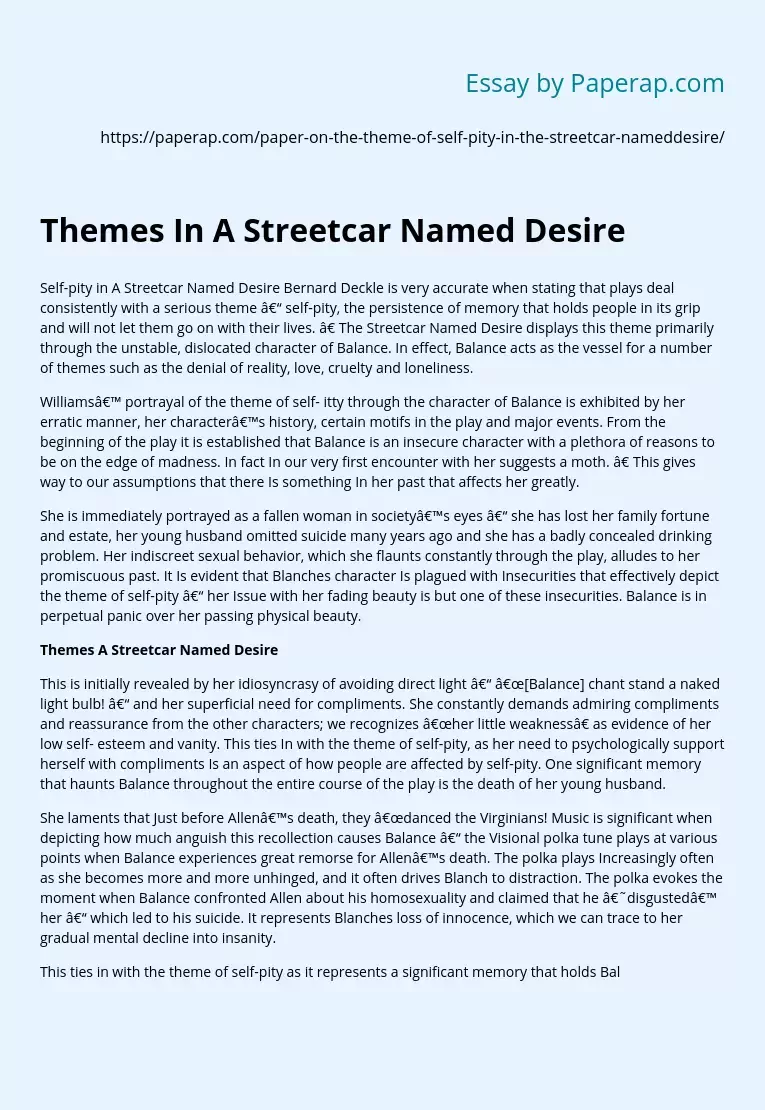Themes In A Streetcar Named Desire
Self-pity in A Streetcar Named Desire Bernard Deckle is very accurate when stating that plays deal consistently with a serious theme – self-pity, the persistence of memory that holds people in its grip and will not let them go on with their lives. ” The Streetcar Named Desire displays this theme primarily through the unstable, dislocated character of Balance. In effect, Balance acts as the vessel for a number of themes such as the denial of reality, love, cruelty and loneliness.
Williams’ portrayal of the theme of self- itty through the character of Balance is exhibited by her erratic manner, her character’s history, certain motifs in the play and major events.
From the beginning of the play it is established that Balance is an insecure character with a plethora of reasons to be on the edge of madness. In fact In our very first encounter with her suggests a moth. ” This gives way to our assumptions that there Is something In her past that affects her greatly.
She is immediately portrayed as a fallen woman in society’s eyes – she has lost her family fortune and estate, her young husband omitted suicide many years ago and she has a badly concealed drinking problem. Her indiscreet sexual behavior, which she flaunts constantly through the play, alludes to her promiscuous past. It Is evident that Blanches character Is plagued with Insecurities that effectively depict the theme of self-pity – her Issue with her fading beauty is but one of these insecurities. Balance is in perpetual panic over her passing physical beauty.
Themes A Streetcar Named Desire
This is initially revealed by her idiosyncrasy of avoiding direct light – “[Balance] chant stand a naked light bulb! – and her superficial need for compliments. She constantly demands admiring compliments and reassurance from the other characters; we recognizes “her little weakness” as evidence of her low self- esteem and vanity. This ties In with the theme of self-pity, as her need to psychologically support herself with compliments Is an aspect of how people are affected by self-pity. One significant memory that haunts Balance throughout the entire course of the play is the death of her young husband.
She laments that Just before Allen’s death, they “danced the Virginians! Music is significant when depicting how much anguish this recollection causes Balance – the Visional polka tune plays at various points when Balance experiences great remorse for Allen’s death. The polka plays Increasingly often as she becomes more and more unhinged, and it often drives Blanch to distraction. The polka evokes the moment when Balance confronted Allen about his homosexuality and claimed that he ‘disgusted’ her – which led to his suicide. It represents Blanches loss of innocence, which we can trace to her gradual mental decline into insanity.
This ties in with the theme of self-pity as it represents a significant memory that holds Balance in its grip and does not let go. She Is constantly harried by this brutal memory and whenever she panics and loses nerd grip on realty, ten variously strokes up . It Is evident Tanat Williams play A Streetcar Named Desire deals with the solemn theme of self-pity – its impact is perfectly exemplified through the character of Balance and she explores this theme extensively. Overall we can link her destitute state and her decline into insanity to the self-decadence that grips her invariably.
Themes In A Streetcar Named Desire. (2019, Dec 05). Retrieved from https://paperap.com/paper-on-the-theme-of-self-pity-in-the-streetcar-nameddesire/

